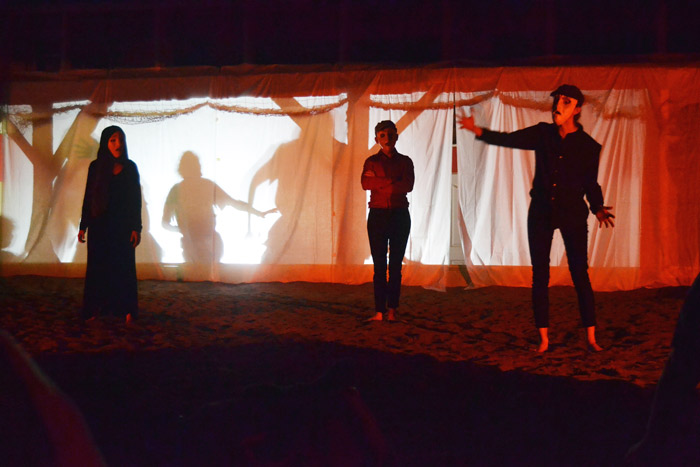The Ancient Greek tragedy Hekabe, also known as Hecuba, takes place on the sandy shores of Thrace after the fall of Troy. The Trojan queen Hekabe has been captured as a slave and kept at a camp, destined for a life of unending despair. Eerie in the most fascinating way, the McGill Classics department’s Hekabe, invites its audience to a warehouse, almost hidden away. Inside, the enormous space is pitch black, save for the glow of flashlights guiding the way across the floor of sand. There, the audience sits on blankets; when the stage lights go up, masked performers move slowly across the sand barefoot.
This peculiar production design, arranged by Lynn Kozak, serves to heighten the fantasy of Euripides’ play and allows audience members to be mentally transported to the time and place of the play. The location is a simulated beach normally used for indoor beach volleyball, but in the dark, dotted with masked figures, it begins to feel otherworldly. The set is minimal, consisting only of the flaps of a tent from which actors emerge, which leaves the cavernous space open to the imagination.
In the play, the bent and broken Hekabe (Delphine Khoury) first suffers the loss of Troy. Next, she loses her daughter Polyxena (Charlotte Raoutenfeld) who is killed as a sacrifice to Achilles. Her final loss is her son Polydorus (Alex Martalogu) who is killed and thrown into the sea by the King Polymestor (Charlotte Raoutenfeld), who had promised to keep him safe. The tone of eternal misery, conveyed by Hekabe and her moaning chorus, at first feels tedious. Hekabe insists over and over that she is weak and wishes for nothing but death. This initial exhaustion of pathos is remedied however, as the play progresses. Hekabe begins to transform from a self-deprecating, mournful old woman to a ruler with vengeance on her mind. Khoury does a skillful job of portraying Hekabe’s gradual buildup of bitterness.
The chorus members are dressed in dark, drooping rags (designed by Stephanie Normand) with their faces exaggerated into perpetual frowns from their white masks. They strike tableaus, echo Hekabe and follow her across the sand like ghosts. These characters’ moans do grow to be tiring, but in special asides they are given a voice to tell their own stories, elevating the mood of despair to anger to match their queen. Both Raoutenfeld and Martalogu play multiple characters. Raoutenfeld, in particular, demonstrates deftness in her ability to switch from the passionate, effeminate Polyxena to the devious King Polymestor; however skilled the actors might be in articulating the play’s flowery language and extensive monologues, nevertheless the characters lack movement. The play could have been staged in a more exciting way given the space it had at its disposal. Since it is lacking in this way, it takes some effort to concentrate and fully appreciate to the story.
Impressively, Hekabe was translated and directed by Classics student Courtney Ewan. In the program, Ewan asserts that the themes of Hekabe—futility, war, grief, and greed—are still very relevant today. The McGill Classics Play, a yearly tradition of the department, exists perhaps for this exact purpose. Hekabe demonstrates the potential that reinterpretation of classics offers. These kinds of productions are important, not only for historic and cultural learning, but as an opportunity to exercise the imagination.







